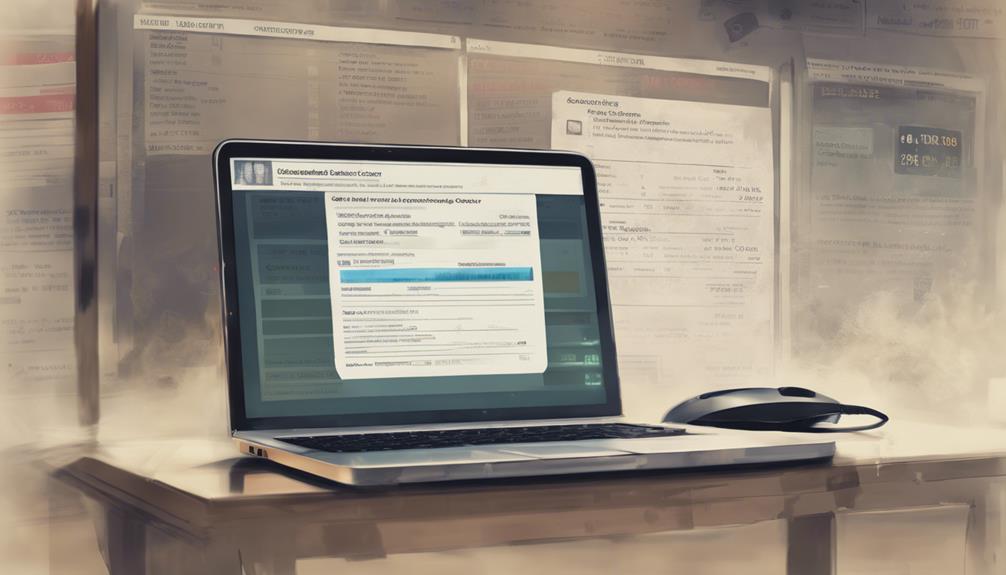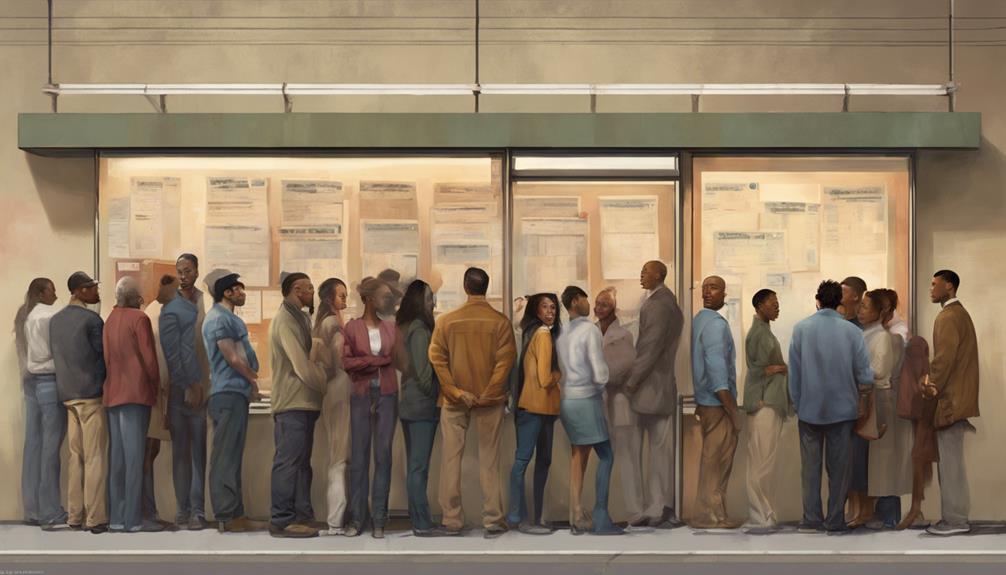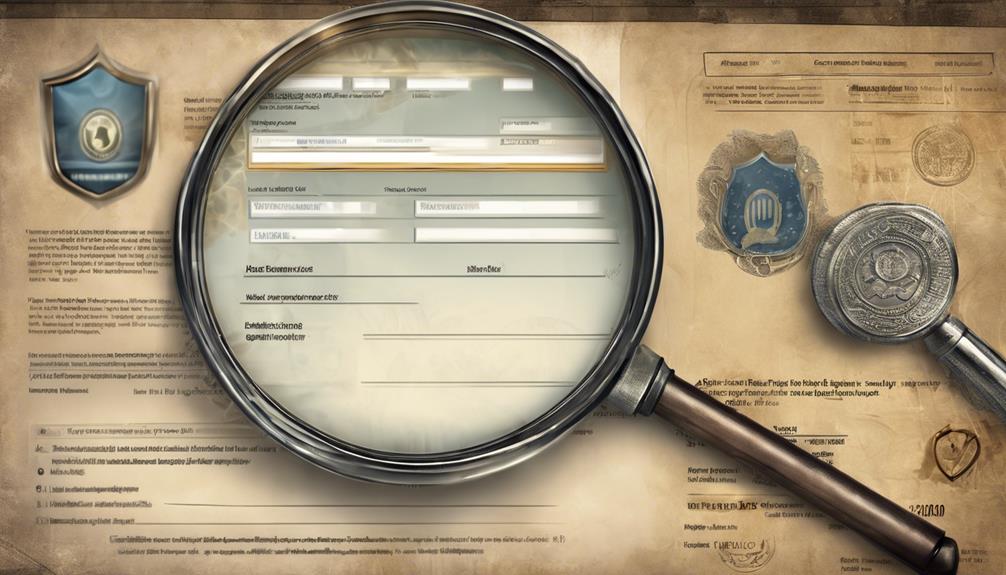Dismissed charges can appear on background checks, affecting job prospects. Employers have the discretion to include this information, requiring transparency from job seekers. Legal regulations govern how employers handle dropped charges, necessitating compliance to guarantee fairness. Job applicants should be ready to address questions about dismissed charges during the hiring process. Understanding the implications of dismissed charges on background checks is essential for successfully exploring employment opportunities.
Key Takeaways
- Dropped charges may or may not appear on background checks.
- Employers have the discretion to include dropped charges.
- Transparency about dropped charges is crucial during the hiring process.
- Seek legal advice to understand how dropped charges may impact job opportunities.
- Dropped charges differ from convictions in their presence on background checks.
Legal Restrictions on Dismissed Charges

Legal limitations on dismissed charges restrict the information that employers can inquire about on background checks. The Fair Credit Reporting Act (FCRA) and guidelines from the Equal Employment Opportunity Commission (EEOC) play a pivotal role in regulating how dismissed charges are handled in the context of criminal records. These regulations aim to safeguard job applicants from unfair discrimination based on past legal issues that didn't result in convictions.
Ban the box laws, which have been enacted in several states and cities, restrain employers from asking about criminal history early in the hiring process. However, these laws may not always explicitly cover dismissed charges, leaving room for potential inquiries during background checks for certain job positions, especially in sensitive industries like banking or healthcare.
Employers must adhere to these legal limitations by providing written disclosure and obtaining permission before conducting background checks that include information on dismissed charges. Understanding these regulations is essential for both employers and job seekers navigating the complexities of the hiring process.
Responding to Dismissed Charge Inquiries
Job seekers facing inquiries about dismissed charges on background checks should be honest and transparent when responding to potential employers. Understanding the impact of dismissals, knowing your legal rights regarding disclosure, and crafting appropriate responses to employer inquiries are vital steps in addressing this sensitive topic during the hiring process.
Impact of Dismissals
When faced with inquiries about dismissed charges during the hiring process, individuals should be prepared to provide transparent and honest explanations. Dismissed charges have the potential to show up on background checks, depending on the thoroughness of the check conducted by the provider. Employers may inquire about dismissed charges to assess an individual's criminal history, especially for roles that require a high level of trust or security clearance.
Job applicants should be forthcoming about the circumstances surrounding dismissed charges, as honesty is typically valued during the hiring process. Seeking legal advice to understand the implications of dismissed charges on background checks, as well as familiarizing oneself with the legal framework including FCRA guidelines and discrimination rights, can empower individuals to respond effectively to inquiries.
Legal Rights Disclosure
Employers seeking information about dismissed charges must adhere to specific guidelines and regulations. When responding to inquiries about dismissed charges on background checks, it's essential to understand the legal rights involved.
Here are some key points to take into account:
- Employers must comply with the Fair Credit Reporting Act (FCRA) guidelines and Equal Employment Opportunity Commission (EEOC) regulations when asking about dismissed charges.
- Ban the box laws in certain locations restrict questions about convictions rather than dismissed charges.
- Job applicants should be honest about disclosing dismissed charges while being aware of their legal rights.
- Employers may inquire about dismissed charges, especially for roles in sensitive industries like banking.
Understanding how to address inquiries regarding dismissed charges can help applicants navigate the hiring process effectively.
Employer Inquiry Response
In responding to inquiries about dismissed charges on background checks, understanding the legal guidelines is crucial for both applicants and employers. Job applicants may face questions regarding their criminal record, arrest records, or why certain charges were dropped. It's vital for applicants to be forthcoming and transparent about dismissed charges during the hiring process.
Employers have the right to inquire about these matters, but they must also adhere to the Fair Credit Reporting Act (FCRA) and Equal Employment Opportunity Commission (EEOC) guidelines. Job seekers should be prepared to discuss the circumstances surrounding the dismissed charges with potential employers, providing context and demonstrating accountability.
Navigating inquiries about dismissed charges requires a clear understanding of the legal framework to ensure compliance with regulations. Employers must follow specific procedures and guidelines when considering dismissed charges in the hiring process, balancing the need for a thorough background check with respect for applicants' rights.
Arrests Without Convictions on Background Checks

Arrests without convictions can still show up on background checks, even if the charges were dropped. Employers may consider this information when making hiring decisions, potentially affecting job opportunities.
Understanding how arrest records can impact one's background check results is essential for job seekers managing the hiring process.
Arrests on Background Checks
Arrests without resulting in convictions can still be disclosed on background checks. Employers conducting background checks may uncover arrest records, even if the individual wasn't convicted of any crime.
Here are some key points to keep in mind regarding arrests on background checks:
- Arrest Records: Background checks can include information about arrests, not just convictions, which means that past encounters with law enforcement may show up.
- Charges Dropped: Even if charges were dropped, an arrest record might still be visible during a background check process.
- Criminal Record: Having an arrest record, even without any resulting convictions, can have implications on job opportunities and how employers perceive an individual's trustworthiness.
- Job Impact: Individuals should be aware that arrests appearing on their background checks could potentially affect their chances of securing certain job opportunities.
- Employment Prospects: Being transparent about past arrests and understanding their presence on background checks is essential for successfully navigating the job market.
Impact of Dropped Charges
Despite charges being dropped, the presence of arrests without resulting convictions on background checks can have a notable impact on individuals seeking job opportunities. Employers conducting background checks may come across records of arrests, even if the charges were dismissed or did not lead to a conviction. This information can still reflect on a person's criminal record and influence hiring decisions. Job seekers should be ready to address any questions regarding dropped charges during the application process to provide context and clarity to potential employers.
| Aspect | Impact |
|---|---|
| Criminal Record | Can still show arrests even if charges were dismissed |
| Arrest Record | Arrests without convictions may be visible |
| Background Checks | Employers may consider this information when making hiring decisions |
Understanding how dropped charges can affect background checks is essential for individuals navigating the job market. Being transparent about these incidents and explaining the circumstances surrounding them can help mitigate any negative implications on job opportunities.
Impact of Criminal History on Employment
Having a criminal history can significantly impact a person's job opportunities. Employers often conduct background checks to evaluate a candidate's suitability for a position, and a criminal record, including dropped charges, can influence their decision-making process.
Here are some key points to take into account regarding the impact of criminal history on employment:
- Dropped charges may still be visible on background checks, potentially raising concerns for employers.
- Employers may consider the circumstances surrounding dropped charges when assessing a candidate.
- Recent dropped charges could have a more notable effect on job prospects, as they may be perceived as a current issue.
- Safety considerations related to the dropped charges, such as violent offenses or theft, may significantly affect hiring decisions.
- Job seekers should be aware of how dropped charges can impact their eligibility for employment and be ready to address any concerns raised during the hiring process.
Overcoming Employment Barriers

Job seekers can take proactive steps to address dismissed charges on their background checks and improve their chances of overcoming employment barriers. When faced with a criminal record that includes dropped charges, individuals should be prepared to discuss these instances during the hiring process.
Employers conducting thorough background checks may still have access to dismissed charges, potentially affecting job opportunities. Understanding how dismissed charges can impact employment prospects is essential for navigating this obstacle.
Seeking legal advice on how to handle dismissed charges on background checks can provide valuable insights and guidance. Legal professionals can offer strategies for addressing these charges transparently and effectively during job interviews, mitigating any concerns that employers may have.
Criminal Charges and Background Check Results
Some background checks may still reveal dropped charges, depending on the employer's chosen screening methods and sources. Employers have the discretion to access information about dropped charges through specific databases or sources utilized for background screenings.
The inclusion of dropped charges in background checks varies, as not all screenings will contain this information based on the employer's criteria and the screening provider used. Job seekers should be aware of what details might be present in their background check and should be ready to address any dropped charges with potential employers.
Even though dropped charges could appear on certain background checks, they aren't considered convictions and mightn't impact employment opportunities similarly.
- Dropped charges may be included in background checks by some employers.
- Employers can access information about dropped charges from various sources.
- Inclusion of dropped charges in a background check isn't universal.
- Job seekers should be prepared to discuss dropped charges with potential employers.
- Dropped charges are distinct from convictions in terms of their impact on job prospects.
Frequently Asked Questions
What Does a Background Check Show in Texas?
A background check in Texas may show various information based on the employer's criteria. It can include employment history, criminal records, education verification, and credit history. Applicants should be aware of what potential employers might find.
Are Charges Still on Your Record in Florida if They Are Dropped?
Like shadows cast by unseen clouds, dropped charges in Florida can linger on records despite no convictions. Employers may uncover this hidden history, affecting job prospects. Awareness of this possibility is crucial for job seekers.
Will Pending Charges Show up on a Background Check in Texas?
Pending charges in Texas may appear on background checks conducted by employers. It is important to inform potential employers about any pending charges to maintain transparency and allow them to take this information into account during the hiring process.
Does Deferred Adjudication Show up on a Background Check in Texas?
Deferred adjudication in Texas, while not a conviction, may appear on background checks. Employers could see this information, potentially affecting job prospects. It is essential for individuals to understand how deferred adjudication is reflected in their criminal records.
Conclusion
To sum up, while dropped charges may not appear on background checks, arrests without convictions can still impact employment opportunities.
According to a survey by the Society for Human Resource Management, 92% of employers conduct criminal background checks on potential hires.
This highlights the importance of understanding how dismissed charges and criminal history can affect job prospects.









